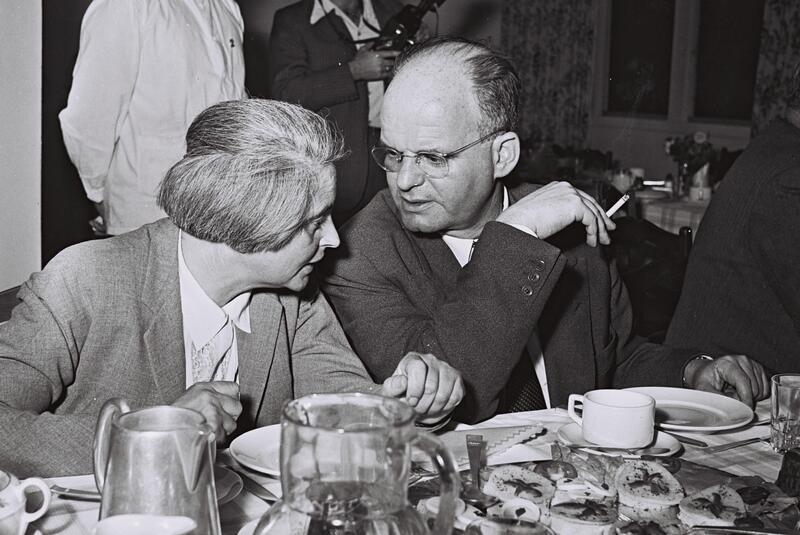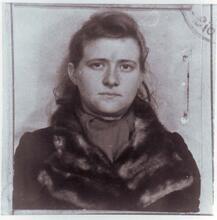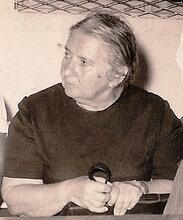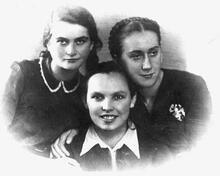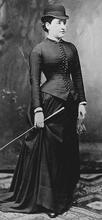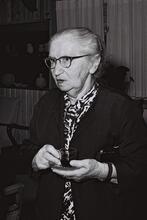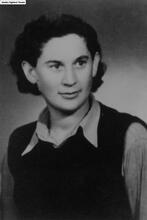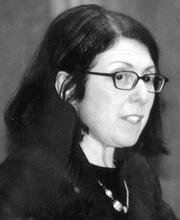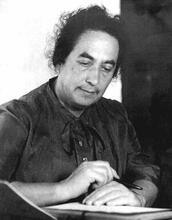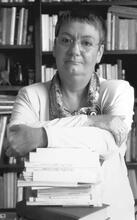Senta Josephthal
As a teenager in Nuremberg, Germany, Senta Josephthal joined the Jewish youth organization, which later merged with the Zionist He-Halutz movement Habonim. After the Nazis took power, she began preparing to emigrate to Palestine, establishing with her husband training programs for German youth also aspiring to emigrate. Once in Palestine, Josephthal and her husband worked on several kibbutzim before establishing their own. She was named to the management committee Fund of the Union of Kevuzot and Kibbutzim in 1953, and she would remain engaged in the Union’s activities—including as its first woman secretary-general in 1962—for decades. She was a member of the center-left political party Mapai, served twice in the Israeli parliament, and joined the executive committee of Histadrut, Israel’s workers’ federation.
Family and Education
Senta Pundov was born in Fürth, a small town near Nuremberg in Germany, a city of ill-repute because it was the center of the Nazi movement and the site of its meetings. Both her parents and grandparents were born in Germany: her father, Ya’akov (d. Tel Aviv) and her mother, Hedwig (Wurburg 1884–Tel Aviv 1973), emigrated to Palestine in 1939. Her parents led a traditionally religious but not Orthodox Jewish life. Ya’akov was a partner in a bicycle manufacturing factory. After it went bankrupt during the economic crisis of the 1920s he established a firm of his own. His income was modest and the family’s standard of living was that of the lower middle class. Hedwig was a homemaker. Senta’s older sister, Lola, was born in 1910.
Senta, who attended primary school in Fürth, was throughout her entire childhood aware of the antisemitic sentiment that surrounded her. Because she wanted to go to university she continued her studies at the Gymnasium in Nuremberg, to which she traveled by train every day in order to fulfill all her obligations and obtain a school-leaving certificate. Since her parents forbade her to ride on the Sabbath, she received a special permit from the Bavarian ministry of education exempting her from studies on that day, which aroused an antisemitic response at the school.
Zionism and Marriage
When she was fifteen years old, Senta joined the Jewish youth movement (Jüdischer Jugend Bund), which joined with the Zionist He-Halutz movement Habonim after Hitler’s rise to power in 1933. There she met Nuremberg-born Giora Josephthal (1912–1962), who was her counselor in the movement. They married in 1936. On completing high school Senta was admitted to Erlangen University, where she studied law and economics, at the same time starting to learn Hebrew in a course on Protestant theology. The divinity students, who were antisemites, refused to sit next to her in lectures, but despite their hostility Senta succeeded in acquiring the basics of Hebrew. After Hitler’s accession to power compelled her to give up her studies, Senta decided to prepare for Lit. "ascent." A "calling up" to the Torah during its reading in the synagogue.Aliyah to Palestine. That aliyah was delayed for over four years; during that period she and Giora established the first Bet He-Halutz in Munich, which became a place for training young people planning to emigrate to Palestine with Youth Aliyah. In 1934 she moved to Berlin in order to help train fourteen- to sixteen-year-old girls and boys. Too old to emigrate with Youth Aliyah and too young to go as Synagogue cantorhalutzim, these youngsters were trained at a farm near Berlin.
After their marriage in 1936, when Giora and Senta Josephthal intended to emigrate to Palestine, Yizhak Ben Aharon, the He-Halutz emissary from Palestine, was expelled from Germany and Giora replaced him as secretary of the movement. In addition to their work at the farm, Senta and Giora raised funds to purchase arms for the Haganah, which David Shaltiel, the Haganah representative, bought in Czechoslovakia. German Jews had a great deal of “black money” that they could not take out of the country, and they directed these funds to the Haganah on the understanding that half the sum would be returned to them in Palestine. When Shaltiel was caught at the German-French border and brought to trial, suspicion also fell on the Josephthals. One night Giora was arrested and his passport confiscated. The couple left Berlin in the spring of 1938 and moved to the agricultural farm in Upper Silesia, near the Polish frontier, where they attempted to put together a group of youngsters who planned to establish a new [jwa_encyclopedia_glossary:342]kibbutz/jwa_encyclopedia_glossary] in Palestine. In autumn 1938 the Josephthals emigrated to Palestine.
Life in Palestine
The couple’s desire to establish a new, independent kibbutz stemmed from the difficulties of absorption experienced by the female/sing.; individual(s) who immigrates to Israel, i.e., "makes aliyah."olim from Germany in the veteran kibbutzim. Their request for admission to the left-wing Kibbutz ha-Meuhad was rejected on the grounds that the German olim were spoiled and incapable of establishing a kibbutz. Yizhak ben Aharon, who was acquainted with the youngsters from his work in Germany, supported them and proposed a compromise: they would come to his kibbutz, Givat Hayyim, in order to see whether they were indeed capable of establishing a kibbutz. In the meantime, World War II broke out and many of the would-be pioneers were unable to reach Palestine, while those who arrived joined their comrades. After training at Givat Hayyim, they moved to a camp in Ra’anannah where they worked in the neighboring settlements. Josephthal worked for two years as a milkmaid for an elderly couple on the moshav Ramot ha-Shavim. The owners had difficulty in milking their cows and hence sought to sell them; when Josephthal left they agreed to sell them to the young kibbutz in order that they remain in her capable hands. The first attempt to settle on the land in Ramat Menashe that the Jewish National Fund had allocated the kibbutz took place in 1944, but due to protests by the Arab sharecroppers it was postponed for a year. Only in 1945, after the sharecroppers as well as the landowners had received compensation, was the kibbutz established on its site and named Gal-Ed in memory of those of its members who had perished in the Holocaust and had not lived to reach the Promised Land.
On the kibbutz Josephthal engaged in various occupations, but primarily in the cowshed. She served in all the major functions in the kibbutz—as treasurer for seven years, as secretary, and as work-coordinator. In 1953 she was elected to the management committee of the Fund of the Union of A voluntary collective community, mainly agricultural, in which there is no private wealth and which is responsible for all the needs of its members and their families.Kevuzot and Kibbutzim, the major financial organ of the large kibbutz movement, and in this capacity she counseled many younger treasurers. In 1955, when David Ben-Gurion demanded that a woman kibbutz member be nominated by Mapai, she was elected to the Third Lit. "assembly." The 120-member parliament of the State of Israel.Knesset. However, Josephthal, who was used to the kind of action which led to practical results, did not enjoy parliamentary activity. Thus she responded positively when the secretary-general of the Histadrut, Pinhas Lavon, turned to her in 1956 to ask her to join the Histadrut executive and establish a department of absorption and development. She served in this position for four years, which were the years of the mass immigration from Poland and Hungary, at a time when development towns were just coming into being.
Politics and Administration
Throughout the years Josephthal participated actively in Mapai party discussions and served as a member in its various institutions. In 1960, due to disagreements with Pinhas Lavon, she began working in the secretariat of the Union of Kevuzot and Kibbutzim, where she stayed for two years, coordinating economic activity. In 1962 she was elected secretary-general of the movement, the first woman to hold this post. At the request of her kibbutz, Gal-Ed, she returned there in 1965 and was appointed its economics coordinator. After the Six-Day War of 1967 she was elected for another term of office as secretary of the Union of Kevuzot and Kibbutzim and remained in this position until 1970. During this period the movement undertook a wide-ranging development program, establishing new settlements in the Golan Heights, in the Jordan Valley, and in the south of the country, absorbing many immigrants from developed countries and establishing a network of Hebrew ulpanim (language schools), which served as the first stop for thousands of Jewish youngsters who came to see whether Israel in general, and the kibbutz in particular, could provide them with a challenge and a home.
In 1970 Josephthal again returned to her kibbutz, this time as its general secretary and director of the Hebrew Ulpan. In 1972 the minister of agriculture asked her to chair the board of management of Mekorot, the national water corporation of Israel. She left this post two years later, when she undertook to head the Settlement Department of the Agricultural Center, a position she held until 1978. In the course of her work at the Agricultural Center, she entered the eighth Knesset in 1976 when MK Zvi Guershoni died, and remained there until the end of the term in 1977, refusing to be a candidate for the ninth Knesset. Returning to her kibbutz in 1978 she began work at the plastics factory jointly owned by Mishmar ha-Emek and Gal-Ed, remaining there till her retirement at the age of 88.
In the course of her long and active life, Senta Josephthal frequently traveled abroad on behalf of national and party organizations. In 1960 she went to India and the Far East; in 1963 she attended the International Socialist Congress in Amsterdam; in 1965, the JNF Conference in London; in 1969, the Congress of Pioneering Movements in the United States; in June 1970, the Congress of the Austrian Socialist Party; in December of that year, she was a member of a Labor Party delegation to Germany; in 1972 she attended the Co-operatives conference in Warsaw; in 1975, an executive committee meeting of the International Organization of Cooperatives in Stockholm.
In 2004 she was awarded the Israel Government’s Ben-Gurion Prize.
Giora Josephthal died in 1962 at the age of 50. His widow and her sister Lola continue to live in Kibbutz Gal-Ed. Giora and Senta had no children.
Senta Josephthal passed away on July 26, 2007, and was buried in Kibbutz Gal-Ed. Her epitaph: "She was a brave leader all her life. Her kibbutz and the kibbutz movement followed in her footsteps."
Josephthal, Giora. The Responsible Attitude: Life and Opinions of Giora Josephthal. New York: Schocken Books, 1966.
Josephthal, Senta. “The Highest Commandment.” The Jewish Frontier (February 1946).

